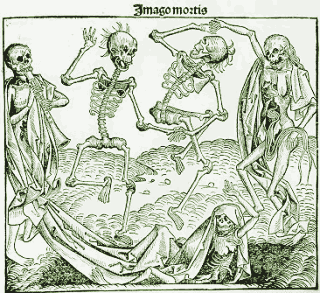I want to say some more about Andrea Dworkin and what her life’s work meant and what we have lost with her death. If there’s one fact about her that’s hard to avoid, it’s how fiercely personal the reactions she inspired were. (The reactions were, at the same time intensely political. That’s because that famous slogan happens to be the truth.) I’ve only encountered Andrea Dworkin through her writing–I never had the chance to meet her or to hear her speak, but the news of the death felt like hearing about the death of someone I had known half my life. But rather than saying more than the halting words I said last night when I heard the news, I think it may be better to remember her in her own words, and in the impact that she made on others in life.
Here’s how L. put it earlier today:
Andrea Dworkin has died, and I’ve wanted to say something about it,
and I’m at a loss, because I didn’t expect her absence to feel so
immediate and so huge. I hadn’t read very much by her in the past
few years, but Intercourse and Letters from a
War Zone were probably the last books to really change my
life, back at the frayed end of my arrogant adolescence, steeped as
I was in privilege and bad literary criticism, when I went around
telling everyone that Dworkin was a brilliant rhetorician
to
avoid having to confront her ideas.
The best I can do is repeat what someone said on feminist_rage:
that Andrea Dworkin was “a necessary person.” It’s common, and
tempting, to wish peace on the dead, and Andrea Dworkin deserves to
be at peace, but I can’t imagine her being satisfied with death, or
with anything short of an almost unimaginable justice.
Andrea’s partner, John Stoltenberg, sent out an obituary and bio this morning based on information for publishers that she had prepared before her death. I got this over the off our backs e-mail list:
ANDREA DWORKIN
September 26, 1946 – April 9, 2005
BIOGRAPHY
Andrea Dworkin is internationally renowned as a radical feminist
activist and author who has helped break the silence around
violence against women. In her determination to articulate the
experiences of poor, lower-class, marginal, and prostituted women,
Dworkin has deepened public awareness of rape, battery,
pornography, and prostitution. She is co-author of the pioneering
Minneapolis and Indianapolis ordinances that define pornography
as a civil-rights violation against women. She has testified before
the Attorney General’s Commission on Pornography and a subcommittee
of the Senate Judiciary Committee. She has appeared on national
television shows including Donahue, MacNeil/Lehrer NewsHour, 60
Minutes, CBS Evening News, and 48 hours. She has been a focus of
articles in The New York Times, Newsweek, The New Republic, and
Time. And an hour-long documentary called Against
Pornography: The Feminism of Andrea Dworkin, produced by the
BBC, was watched by more viewers in England than any other program
in the Omnibus series and has been syndicated throughout Europe and
Australia. Filmed in New York City and Portland, Oregon, it
included excerpts from Dworkin’s impassioned public speaking and
intimate conversations between Dworkin and women who had been used
in prostitution and pornography, most since childhood.
The author of 13 books of fiction, nonfiction, and poetry, Dworkin
is a political artist of unparalleled achievement. In every
century, there are a handful of writers who help the human race to
evolve,
said Gloria Steinem; Andrea is one of them.
Dworkin’s first novel, Ice and Fire, was
published in 1986; Mercy followed in 1990 to wide
acclaim in the U.S. and abroad- lyrical and passionate,
said
The New York Times; one of the great postwar
novels,
said London’s Sunday Telegraph; a
fantastically powerful book,
said the Glasgow Herald. Her
latest nonfiction book is Life and Death: Unapologetic
Writings on the Continuing War Against Women (The Free
Press).
Dworkin’s activist political life began early. In 1965, when she
was 18 and a student at Bennington College, she was arrested at the
United States Mission to the United Nations, protesting against the
Vietnam War. She was sent to the Women’s House of Detention, where
she was given a brutal internal examination. Her brave testimony
about the sadism of that experience–reported in newspapers around
the world–helped bring public pressure on the New York City
government to close the Women’s House of Detention down. An
unmarked community garden now grows in Greenwich Village
where that prison once stood.
Dworkin’s radical-feminist critique of pornography and violence
against women began with her first book, Woman Hating, published in
1974 when she was 27. She went on to speak often about the harms to
women of pornography and addressed the historic rally in 1978 when
3,000 women attending the first feminist conference on pornography
held the first Take Back the Night March and shut down San
Francisco’s pornography district for one night.
In 1980 Dworkin asked Yale law professor Catharine A. MacKinnon for
help in bringing a civil-rights suit for Linda Marchiano, who as
Linda Lovelace
had been coerced into pornography, including
Deep Throat. Under current law, Dworkin and MacKinnon discovered,
there was no way to help her. Later, in 1983, while co-teaching a
course on pornography at the University of Minnesota Law School in
1983, they were commissioned by the Minneapolis City Council to
draft a local ordinance that would embody the legal principle,
first proposed by Dworkin in Linda Marchiano’s behalf, that
pornography violates the civil rights of women. Dworkin, MacKinnon,
and others organized public hearings on the ordinance-the first
time in history that victims of pornography testified directly
before a governmental body. Dworkin has been a uniquely influential
inspiration both to legal thinkers and to grass-roots feminist
organizers. Her original legal theory–that harm done to women
ought not be legally protected just because it is done through
speech,
and that sexual abuse denies women’s speech
rights–has not only fomented a rift between advocates of civil
rights and civil liberties but has also generated a Constitutional
crisis, a fundamental conflict between existing interpretations of
the First and Fourteenth Amendments. A tireless fighter against the
pornography industry and those who collaborate with it, Dworkin has
herself been stigmatized professionally for her efforts to help
women harmed by pornography–in part because U.S. media
conglomerates side with pornographers’ right to turn women into
speech.
Since the American Booksellers Association and the
American Publishers Association became plaintiffs in a 1984 lawsuit
against the Indianapolis ordinance, Dworkin’s options for
publishing in the U.S. have dropped off dramatically. Her last
three books have had to be published in England first. Attempts to
get the BBC documentary broadcast in the U.S. have so far been
unsuccessful. Yet in 1992 the BBC invited Dworkin to return, to
participate in a nationally televised debate on political
correctness
at the prestigious Cambridge Union.
Called the eloquent feminist
by syndicated columnist Ellen
Goodman, Dworkin has been a featured speaker at universities,
conferences, and Take Back the Night marches throughout North
America and Europe, speaking out powerfully against crimes of
violence against women, the new right, racism, and anti-Semitism.
The New York Times described one of her lectures on pornography at
New York University Law School as highly passionate,
and
reported that the audience responded with a standing ovation.
She moved this audience to action,
said a Stanford
University spokesperson. A University of Washington spokesperson
said, She empowered the women and men present; in fact a
coalition on violence against women came out of her lecture.
Ms. magazine admires the relentless courage of Dworkin’s
revolutionary demands. . . Her gift . . . is to make radical ideas
seem clear and obvious.
Stoltenberg said that contributions in memory of Andrea’s life and work can be made to:
The Schlesinger Library
The Andrea Dworkin Fund
Radcliffe Institute
10 Garden Street
Cambridge, MA 02138-3600
… or to the domestic violence shelter or rape crisis center of your choice.
(Contributions to The Schlesinger Library designated for the Andrea Dworkin Fund will go towards processing her papers and creating an online guide to her work–much of which is hard to find or out of print.)
There’s more about her life, her legacy, and her passing at:
One of the most fitting pieces I’ve read on Andrea and her life’s work is actually a few years old: Louise Armstrong’s piece (in The Guardian, again), The trouble with Andrea (2005-06-25):
It may well be time to face one of the stranger phenomena of
contemporary feminist life. And it is this: despite all the
requirements for feminist celebrity status, spelt out for us
recently by Elaine Showalter in these pages — TV appearances,
public buzz, a blitz of stories in the press — the ur-feminist
icon, the real template, is a woman with none of the above. It is
not Hillary Clinton or Oprah or Princess Diana. This woman is not a
celebrity
by the acknowledged standard. She is… Andrea
Dworkin. More than any of the above, she matches Showalter’s
definition of feminist icon: someone on to whom a disproportionate
amount of adulation and loathing is projected.
Projected is the key word here. To the pornographers and the new
female libertines, she is the symbol for man-hater, sex-hater,
killjoy. The feminists who adore her and flock to her lectures sit
so rapt it is tempting to use the word rapture (she is a brilliant,
even mesmerising speaker). There is something quasi-religious
about the divide between devoted followers and those who would
brand her a heretic, pillorying her over and over, as though to
reassure themselves that they have the power.
Both sides have transformed a human being into a symbol. No other
living person I can think of, who is so much out of the public eye,
is so deeply entrenched in the public psyche as either heroine or
demon.
What is strangest about the demonisers is, why do they bother? She
does not have her own TV show, her books are not bestsellers. Why
the need to keep bringing her up in order to put her down? It is
parallel to what so much media does to feminism itself: It’s
over! Retro! Let’s party, girls!
So strong a signifier has Dworkin’s name become that it is dragged
in, higgledy-piggledy, whenever the speaker/author wishes to dump
poo on advocacy with which he/she disagrees. I have seen her name
yanked in out of left field, in the New York Times,
for example, to say that an author displays an Andrea
Dworkin-like
attitude toward the genetic alteration of apples.
…
Think of it this way: Dworkin is a true feminist icon precisely
because she is not a celebrity in the safe sense. She has not been
brought down to scale, as Hillary Clinton was, by constant
exposure; by Bill’s peccadilloes; by her own efforts to adjust to
please the public, to moderate.
Dworkin is a threat, of course, to exactly the extent that radical
feminists have always posed a threat — pointing out
unapologetically the degree to which violence against women and
children by men remains rampant. She will not shut up.
Read the whole thing.
And it’s true, as Armstrong says, that it’s tempting to say that if Andrea Dworkin didn’t exist, we would have had to invent her. … Which, come to think about it, is exactly what we have done.
But the truth is that Andrea was not just a symbol–although she was that–she was a living, breathing, fierce, outraged, loving, hurt, unflinchingly principled, deeply compassionate human being. She could not have been made what she has been made, or meant what she has meant, without being who she is. And that is something that’s best experienced first hand, in her own words. You can read a lot of her most important work at The Andrea Dworkin Web Site. Here are some passages that struck me last night and today when I was reading over her books again.
These quotes are from Letters from a War Zone, a collection of essays, articles, and speeches from 1976 – 1989.
From Feminism: An Agenda (1983):
So let me just talk with you briefly about how the women’s movement
gets its information, and why we are almost always right. In the
last ten years there has been a pattern. Feminists have said that
something happens or is true and then ten thousand authorities have
said that’s bullshit.
And then somebody started doing
studies, and then three years later they say, well, well, rape
is endemic.
Right? They say to us, well your figure was too
low, it’s ten times that, right? The FBI discovers rape, right?
The same thing happened with battery. Women love to be beaten: that
is what authorities think and say. Battered wives begin speaking.
Women begin to emerge from situations in which they have been held
captive and terrorized for ten years, twelve years, fifteen years.
Oh, what crap,
the authorities say. Five years later we have
sociologists telling us that they did a study in California and
found out that fifty percent of married women have been beaten. It
wasn’t news to us. We have a terrific trick. We listen to the
women. It is an unbelievably top secret method that we don’t let
anyone else know about.
From A Feminist Looks at Saudi Arabia (1978):
But mostly, inability to believe surfaces on days when Mr Carter
and his cronies–and yes, I must admit, especially Andrew
Young–discuss our good friend, Saudi Arabia. That is, their
good friend, Saudi Arabia. I hear on newscasts that Mr Carter was
enchanted by Saudi Arabia, that he had a wonderful time. I remember
that Mrs Carter used the back door. I remember that the use of
contraceptives in Saudi Arabia is a capital crime. I remember that
in Saudi Arabia, women are a despised and imprisoned caste, denied
all civil rights, sold into marriage, imprisoned as sexual and
domestic servants in harems. I remember that in Saudi Arabia women
are forced to breed babies, who had better be boys, until they die.
Disbelief increases in intensity as I think about South Africa,
where suddenly the United States is on the side of the angels. Like
most of my generation of the proud and notorious sixties, a
considerable part of my life has been spent organizing against
apartheid, there and here. The connections have always been
palpable. The ruthless economic and sexual interests of the
exploiters have always been clear. The contemptuous racism of the
two vile systems has hurt my heart and given me good reason to
think democracy
a psychotic lie. Slowly activists have
forced our government, stubborn in its support of pure evil, to
acknowledge in its foreign policy that racist systems of social
organization are abhorrent and intolerable. The shallowness of this
new commitment is evident in the almost comical slogan that
supposedly articulates the aspirations of the despised: One Man,
One Vote. Amerikan foreign policy has finally caught up, just
barely, with the human rights imperatives of the early nineteenth
century, rendered reactionary if not obsolete by the Seneca Falls
Convention in 1848.
From I Want a Twenty-Four Hour Truce During Which There Is No Rape (1983):
And if there would be a plea or a question or a human address in
that scream, it would be this: why are you so slow? Why are you so
slow to understand the simplest things; not the complicated
ideological things. You understand those. The simple things. The
clichés. Simply that women are human to precisely the degree and
quality that you are.
And also: that we do not have time. We women. We don’t have
forever. Some of us don’t have another week or another day to take
the time for you to discuss whatever it is that will enable you to
go out into those streets and do something.
…
I want to see this men’s movement make a commitment to ending rape
because that is the only meaningful commitment to equality. It is
astonishing that in all our worlds of feminism and antisexism we
never talk seriously about ending rape. Ending it. Stopping it. No
more. No more rape. In the back of our minds, are we holding on to
its inevitability as the last preserve of the biological? Do we
think that it is always going to exist no matter what we do? All of
our political actions are lies if we don’t make a commitment to
ending the practice of rape. This commitment has to be political.
It has to be serious. It has to be systematic. It has to be public.
It can’t be self-indulgent.
From Look, Dick, Look. See Jane Blow It. (1979):
I came here to say one simple thing: our honor and our hope is in
our ability to name integrity the essential reality of revolution;
our future will bring that integrity to realization only if it we
put it first; we put it first by keeping our relationship to real
life immediate and by respecting our capacity to understand
experience ourselves, not through the medium of male ideology, male
interpretation, or male intellection. Male values have devalued us:
we cannot expect to be valued by honoring male values. This is a
contradiction without resolution except in our obliteration.
These passages are from Andrea’s memoir, Heartbreak: The Political Memoir of a Feminist Militant (2002, pp. 191, 211):
I long to touch my sisters; I wish I could take away the pain; I’ve
heard so much heartbreak among us. I think I’ve pretty much done
what I can do; I’m empty; there’s not much left, not inside me. I
think that it’s bad to give up, but maybe it’s not bad to rest, to
sit in silence for a while. I’m told by my friends that it’s not
evil to rest. At the same time, as they know, there’s a child being
pimped by her father with everyone around her either taking a piece
of her or looking the other way. How can anyone rest, really? What
would make it possible? I say to myself, Think about the
fourth-generation daughter who wasn’t a prostitute; think about
her. I say, Think about the woman who asked herself whether or not
it was bad to penetrate a baby with an object and figured out that
it might be; think about her. These are miracles, political
miracles, and there will be so many more. I think that there will
be many more.
…
A memoir, which is what this is, says: this is what my memory
insists on; this is what my memory will not let go; these points
of memory make me who I am, and all that others find
incomprehensible about me is explained by what’s in here. I need
say that I don’t care about being understood; I want my work to
exist on its merits and not on the power of personality or
celebrity. I have done this book because a lot of people asked me
to, and I hope this work can serve as a kind of bridge over which
some girls and women can pass into their own feminist work, perhaps
more ambitious than mine but never less ambitious, because that is
too easy. I want women to stop crimes against women. There I stand
or fall.
 Roderick finds the spectacle of
Roderick finds the spectacle of 


